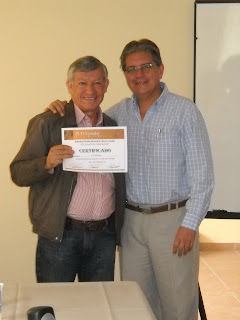Translation: Happy New Year and Goodbye to the Old Year
In the United States, we have traditions of getting together with friends on New Year’s Eve, maybe attending a midnight service, alternatively watching the ball drop in Time Square, and probably singing “Auld Lang Syne” and toasting to the New Year quite soon after midnight.
In Ecuador there are traditions as well, and I’d like to introduce a few that I participated in this past weekend to say goodbye to the old year and welcome in 2011.
On the afternoon of December 31
st, I took a trip down to one of the main streets in Quito, which is lined each year by floats that poke fun of events in the past year. Since I don’t understand all the political jabs, it was more interesting for me to see the creativity put into the design of these larger-than-life figures.


A character on one of these floats is called
un año viejo, or in English, an “old year.” They represent all the good and the bad that happened in the past 12 months, and at midnight on New Year’s, they are all set on fire, representing that both the old year and the people and events that marked that year have ended. That idea of getting rid of the past and starting out fresh is a reminder for me of the command in Ephesians 4 to “put off your old self” and “to be made new in the attitudes of your minds.” When I first heard about the tradition of burning the “old year,” I thought it would be an insult to be the one represented and burned, but my friends explained to me that it’s actually a very good thing to be the effigy used for the
año viejo. In a sense, being burned as the
año viejo gives the person a new opportunity to put off the problems of the old self and be made new as the new year begins afresh.

On a less philosophical note, Ecuador also has a unique tradition of the
viudas or “widows” of the
año viejo, who stop cars asking for money for the “funeral expenses” of the dead
año viejo. In reality, these are usually young boys who dress in black with skirts and sometimes a wig. Everyone knows that if you drive around Quito on the 31
st, you need to have a lot of change to make it past the makeshift barricades that these
viudas set up. I’m not sure the history or significance of this, but I suppose it’s entertaining and a good way for these kids to get a little extra pocket change.


With my host family, we bought and made our own
año viejo to burn at midnight. Since the youngest sister had wanted Germany to win the Soccer World Cup, they made an octopus selecting Spain over Germany out of paper mache and pizza boxes. Additionally, they bought a sawdust-stuffed representation of Osama Bin Laden for reasons that are beyond my comprehension. As part of the unique family tradition, the boys in the family jumped over the burning
año viejo, resulting in at least one burned toe. We joined the rest of the city to set off fireworks and light sparklers, and in the end, it looked like fog had rolled in because every street we traveled on the way home was still full of smoke from the
años viejos and fireworks. In this way we welcomed in a new year in Quito, and look forward to great things in the next 362 days!



















